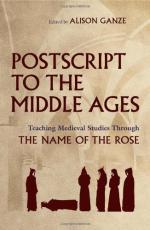|
This section contains 4,963 words (approx. 17 pages at 300 words per page) |

|
SOURCE: “The Riddle of Umberto Eco,” in The New York Review of Books, Vol. 42, No. 2, February 2, 1995, pp. 33-5.
In the following review, Williams outlines the tenets of Eco's literary thought, highlighting his interpretation strategies and ideas about the author-reader relationship.
At the beginning of Umberto Eco's novel Foucault's Pendulum, there are two epigraphs. Every chapter of this book also has an epigraph, so these are particularly prominent—they come before everything else. One is a quotation from an occultist writer, Heinrich Cornelius Agrippa von Nettesheim. The other is from a contemporary logician, Raymond Smullyan: “Superstition brings bad luck.” The quotations bring together two obsessions in which much of Eco's work is involved, one with logical paradox, the other with obscure facts about Hermetic traditions, magical riddles, prophecies, the cabbala, and interpretations of history and nature according to complex, hidden, and often conspiratorial patterns.
As its many readers know...
|
This section contains 4,963 words (approx. 17 pages at 300 words per page) |

|


